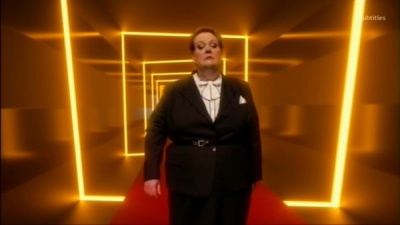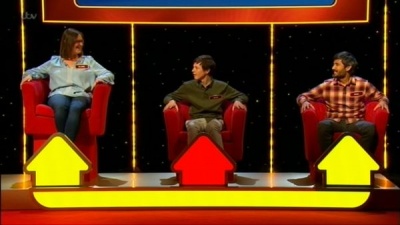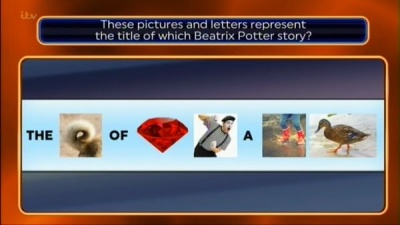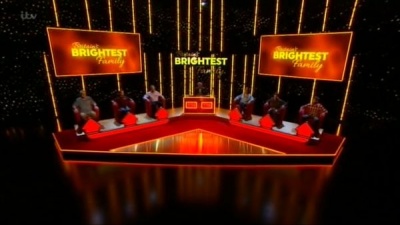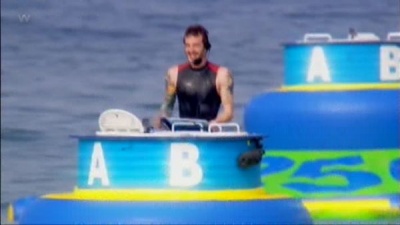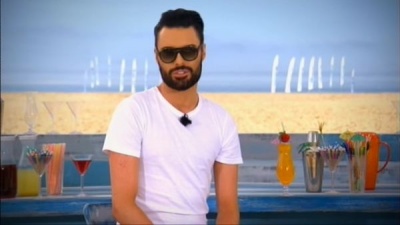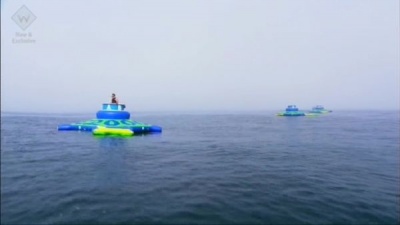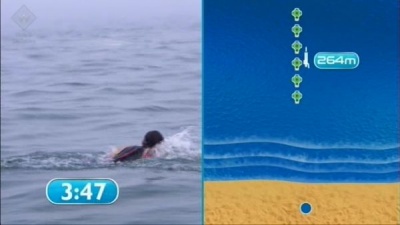Weaver's Week 2018-02-04
Last week | Weaver's Week Index | Next week
This week, we're going under with The Wave, sitting down with Mastermind, and moving towards the sharp end of Quizzy Fridays. But first, a message from the Governess.
Contents |
Brightest Family
Gameface for ITV, from 10 January
With ITV set to become The Chase Channel on Easter Sunday, it's essential for the stars to branch out into all parts of the schedule. Already, we've seen Paul Sinha in fashion programme Sharp Dressed Man, and Jenny Ryan fronts topical discussion show Loose Vixens.
Next month, we'll see Shaun Wallace and Robert Rinder team up to go wrestling, that's I Fought The Law (And The Law Won). Mark Labbett has landed his dream job, sampling the work on Super Crumpets Fudge and Biscuits Traybakes Scones and Toasties.
Bradley Walsh, of course, already has his role on Coronation Street, and his other quiz Cash Trapped. Anne Hegerty also stays in the world of brain games, with her new quiz "Britain's" Brightest Family.{1}
As the name suggests, Brightest Family is a contest for families. For this show, a "family" is one child in their early teens, and two relatives of an older generation. Parents, aunts, grandparents, all are welcome.
The teen is the team captain, of course, and introduces each of their older relatives. We get some quite lengthy introductions, and a brief chat between Anne and the contestant.
Brightest Family has a gimmick in its gameplay. In buzzer rounds, a player will buzz in and nominate a member of their team. Joe, the team captain, might think father Darren will get this crossword clue, and will buzz in for him. Arrows indicate to the viewer who has nominated whom.
Brightest Family has a corresponding gimmick in its presentation. When a player is nominated, their chair rises in the air on a pneumatic piston. This serves two effects: it makes it very clear to the viewer who is to answer. And it makes it clear to the player who is to answer, once they've stopped rising like a rocket.
The heart of any quiz is the questions, and Brightest Family doesn't bother with the usual trivia. Thank goodness! The opening and closing rounds are a mixed bag. There's "which historical figure would put up this dating profile", a lovely way of asking a question about history without reeling off a list of achievements. And there are buzz first, think later questions: how many "S" in "Mississippi State"? After the buzzer goes, the nominated player has five seconds to give an answer, perhaps long enough to think it through.
In between these team rounds, they have solo challenges. One is on words: etymology, foreign languages, miniature crosswords. One is on numbers: complete the sequence, do some algebra based on celebrity values. And one round is on logic problems: which segment completes the bigger picture, what's missing, which is the reflected word.
The scoring is interesting. Buzz in and get the question right, 10 points in the bag. (20 in the final round, just to force some tension.) Buzz in and be wrong, and the points go to the opposition. They don't need to answer to score the points, and they don't get the question themselves for a bonus.{2}
Anne Hegerty is a credible host. She's in character as The Governess: stands for no nonsense, firm when she has to be, but always with a little twinkle in her eye. In these early episodes, it's clear when Anne is improvising or working off a lightly-rehearsed script. She sounds much less fluent and natural when she's reading off the autocue.
Brightest Family is a half-hour quiz, perhaps the first such in ITV primetime since Shafted. That's the only point of similarity, Brightest Family features well-written questions, our only complaint is that some of the pictures are a little too small to play along at home. With 25 questions, the show doesn't move at a fast pace, but nor does it dawdle. And it's a friendly show, while there has to be a winner there's no disgrace or shame in coming second.
All things considered, Brightest Family is a breezy programme, and we rather hope it's the start of a long-running series.
The Wave
Primal Media for UKTV, shown on W, 15-19 January
Television has a problem. Well, television has many problems, but let's solve them one at a time. Watching people swim in the ocean is dull. It always makes for bad television. The person moves slowly, and we never have anything to judge their speed. It's not like on the track, where we can see Usain Bolt move like lightning. It's not even like in a swimming pool, where we can see Sharron Davies up against the edge of the pool. Open water swimming will make for drab viewing.
The Wave has a simple solution to this television problem: don't show too much of people swimming. Which, for a quiz-slash-action game show that's centred around swimming, seems to be a bizarre strategy. Does it work?
Each game is played by a couple. One of them will swim out to sea. 200 metres from the beach is the first in a series of pontoons. In that pontoon is a question, and two possible answers. One answer holds cash, the other holds a lead weight to slow down the swimmer. Further pontoons are spaced further out to sea, for increasing amounts of money. When the swimmer has had enough, they can turn for home, hoping to make it back to the beach in the allotted three minutes.
The player on the beach will also be asked questions, each will add a further ten seconds to the time. For the swimmer, assistances are available – goggles, flippers, snorkels can be hired at an extortionate rate. And their safety is assured, a motorboat is always within hailing distance, crewed by a professional swimmer.
Rylan Clark-Neal is the host, and we've always found him to be a superb people person. The segments where he's talking to the contestants are interesting, he's able to cajole people into telling their stories well. Any quiz requires questions, and the ones here are also interesting. The solo questions are short and snappy, the ones for cash prizes encourage debate between the swimmer and their team-mate on the beach. Even though they're this-or-that questions, we think they're well above average.
So why does The Wave leave us nonplussed? In part, it's the sluggish pace. In most episodes, we're going to see seven cash questions, and fifteen questions for time, plus two swims for home. (Yes, each episode has two games.) That's fewer action points than Brightest Family manages in half the time. We can't chop out enough time to make three episodes per viewing hour, that would be too fast. The Wave gives itself the room it needs to breathe, but gives itself so much room that it gets carried away from harbour.
There are many shots of swimmers at buoys in the ocean, all of them completely interchangeable. Against the sea, we have no sense of perspective, no sense of speed, no way to judge if the next buoy is large or near. Many episodes featured mist rising or falling, the featureless grey backdrop only added to the drab nature of the show.
And there wasn't much variety in the contestant pool. At least one of each pair has to be fit, they've got to be capable of swimming 500m at sea, and swimming perhaps 200m in three minutes. As a direct consequence: this show is going to be played by young people. We're only going to see one sort of player, young and fit. It's not like W's last commission, Don't Say It, Bring It, which could be played by people of all ages.
Overall, we found ourselves washed away by The Wave. Once we'd seen a couple of episodes, we felt like we'd seen all it had to offer. Certainly worth the commission, but we don't see this as a long-running show, and we don't know of a way to tweak it into something better.
Mastermind
An interesting piece by Mark Helsby, the Mastermind producer, in the current Radio Times. He offers some implicit hints for contenders picking their specialist subject.
Don't ask for anything you've seen this series. Mr. Helsby says that Mastermind doesn't repeat subjects from one series to the next; in our experience, the return time seems closer to four years.
Do be original. They could fill the series three times over with people who wanted to take Harry Potter, and could have complete months of heats on Blackadder and Father Ted. These subjects aren't banned, but they're exhausted, the question-setters can't find any new and original questions to ask. And we viewers are exhausted too, variety is the spice of life.
Don't try to be too narrow. Single books and plays will not be used – you couldn't have "Romeo and Juliet the play", though we suspect the producers might negotiate around "Cinematic depictions of Romeo and Juliet". They don't accept over-broad topics, like "The complete works of Shakespeare" – but breadth is a matter of opinion, as topics this column reckons are too broad, like "Top ten singles of the 1960s", do get accepted.
Do know your sources. There need to be two quality books on a historical or biographical subject, and it helps the contender to cite reference works they know about.
This column has one standing criticism of the Mastermind questions, particularly in pop culture rounds. They tend to the trivial and microscopic. They don't test the contender's understanding of the subject as a whole, as happens more often in biographical-historical rounds.
For instance, a question might be, "During the 2008 Mastermind final, in which position was winner David Clark introduced?"{3}. Easy to look up, easy to verify, but of little importance to understanding the subject as a whole. We might hear "The first ten heats in 2004 were stripped on weeknights at 9pm, before highlights of which sporting event?"{4}. This is interesting, and it relates to the show's importance (or otherwise) in the greater scheme of things. We wouldn't expect to hear "The first round tests depth of knowledge and the second breadth: Mastermind both subverts and endorses which storytelling idea?"{5}. It's a point of style, we understand why the question-writers do it, and we reckon they've been a little less trivial this series.
Semi-final 1
All of which brings us to the first semi-final. Very little to choose between the contenders, all scored between 12 and 14 on general knowledge in their heats. We'll cover the contenders in the order they returned to the chair for their general knowledge round.
Richard Cheney had a very slow start in his specialist round on the Tolpuddle Martyrs, recovering to finish with 7 points. The questions simply don't fall his way in the second stage, closing on 13.
Pam Poole reached 8 on Egyptian gods and goddesses, including a namecheck for our favourite casserole chain, Imhotep. She sets the cat amongst the pigeons in general knowledge, dredging up the Blues and Royals and obscure hits for Squeeze. 22 (0 passes) is the score to beat.
Andrew Jackson was the subject for Philip Isaac, he reaches 8 (1 pass). Another strong general knowledge set, but he's always behind the curve from that pass earlier. He finishes on 22 (2 passes).
Teresa de Billot is this week's high-scoring loser; she made 10 on Olympic track and field 1976-92, a slight decline from her perfect heat round. Rendering the film title as "Fried Green Tomatoes" seems to put the contender off her stride a little, and she closes on 20.
An interesting tactic from Ben Holmes, he gives passes while taking questions on Daniel Clowes' graphic novels. 10 (2 passes) puts him last into the chair, knowing that he needs 13 to win. Even with a wrong answer, that's a tough ask, and it goes down to the question in progress when the buzzer goes.
"I've started so I'll finish" is the rule, and Ben Holmes knows his malware from his software. That lifts him to 23 points (and 2 passes), and a place in the final. We'll see him again on – we think! – 16 March.
This Week and Next
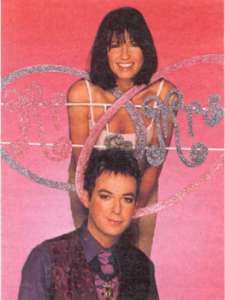
The death of Stacey Young occurred last week. The model and dancer had some faint game show connections, she was the assistant to Julian Clary in ITV's short-lived Mr and Mrs revival. Stacey, the wife of pop singer Paul Young, died of brain cancer aged 52.
Brendan Cole has left Strictly Come Dancing. The long-term professional dancer has been shown the door after 14 years, claiming that the BBC failed to renew his contract. No one person is bigger than Strictly: not Brucie, not Len, and we'll see it's not Brendan.
"A fine balance between lateral thinking and panic," said Lydia Mizon of the Escapologists on Only Connect. Her team played the Dandies, who made many mistakes. We can forgive these youngsters not remembering the Sunday Correspondent, the best Sunday publication ever. We can understand why they don't associate John Craven with Newsround, he left around the time they were born. But to confuse Newfoundland with Prince Edward Island?
This rocky start doesn't fox them, the Dandies spot words removed from TV show titles for a lovely three points. Escapologists strike back with three on consecutive numbers sharing letters, and it's 6-6 into the walls. Escapologists take the better of some hard walls, and this proves crucial. Dandies win Missing Vowels by 8-7, but it's not quite enough; the Escapologists take the win, 19-17.
University Challenge moved into its interminable group phase, with Bristol playing Newcastle. Newcastle won by 225-135. It was a game of three halves: Newcastle worked out some of the starters ("egalite" and "Holi" were standouts) to lead 95-50. Then Bristol came back to open a lead of their own, thanks to a strong buzz on "Four Quartets". Newcastle would not be denied, buzzing and bonusing well to the result – Newcastle's final bonus rate was 22/33, strong at any stage.
BARB ratings in the week to 21 January.
- Call the Midwife is the new most-seen show (BBC1, Sun, 9.1m). Dancing on Ice the top game (ITV, Sun, 6.75m).
- Inches behind is BBC The Voice (ITV, Sat, 6.6m). Would I Lie to You was on Friday this week (BBC1, 4.95m) and beat Pointless Celebrities (BBC1, Sat, 4.3m).
- Just behind on ITV: The Chase (Tue, 4.15m), Through the Keyhole (Sat, 3.9m) and Brightest Family (Wed, 3.7m).
- On Channel 4, good scores for Hunted (Thu, 2.75m) and SAS Who Dares Wins (Sun, 2.55m). Over on BBC2, University Challenge (Mon, 2.5m) beat Only Connect (Mon, 2.25m) and Mastermind (Fri, 2.2m). Channel 5's Celebrity Big Brother snapped at their heels (Tue, 2.15m).
- A good score for Village of the Year (C4, Sat, 1.5m), perhaps helped by BBC1's alternative being Wedding Day Winners. ITV2 leads on the digital tier, with Release the Hounds (Thu, 715,000) ahead of Celebrity Juice (Thu, 700,000). Celebrity Big Brother (5Star, Sat, 555,000) is third.
- And the next three digital originals? Portrait Artist of the Year 2018 (Artsworld, Tue, 325,000), Sam and Mark's Big Friday Windup (CBBC, Fri, 210,000), and Dinner Date (ITVBe, Wed, 130,000). The Wave peaked on Monday (W, 98,000).
This week, Mel and Måns are in Brighton for Eurovision You Decide (BBC2, Wed), the BBC's attempt to find the new "OK ou KO". What Would Your Kid Do? asks Jason Manford (ITV, Tue). Masterchef Us begins (W, from Monday), and Fferm Ffactor Selebs (S4C, Tue) puts the "eck" into S4C.
Footnotes
{1} Why the quotes? When you're inviting contestants from the island of Ireland, they're not from Britain. Let's have accuracy in show titles. Back
{2} Schlag den Raab does do this, a wrong answer can give twenty points to the opponent, a right answer will give ten to you. It leads to people not buzzing in till they're sure, and while it's a viable gimmick, it would be too much here. Brightest Family already has its buzz-in-to-nominate complication, and that's quite enough. Back
{3} Fifth. Back
{4} The All-England Wimbledon Rainwear and Umbrella Exposition (Incorporating Cagoule '04, Tim Henman's Flame, and Middle Sunday Play). Back
{5} Small reference pools. Back
Photo credits: Gameface, Primal Media.
To have Weaver's Week emailed to you on publication day, receive our exclusive TV roundup of the game shows in the week ahead, and chat to other ukgameshows.com readers, sign up to our Yahoo! Group.


